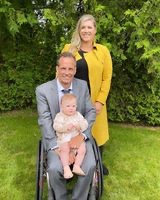Father’s Day, as a day to celebrate fathers is gone for another year but the days of father, of fathering, of ‘doing the Dad thing’ continue.
For the past several decades, copious literature illustrates that the role of father has changed, has shifted dramatically. The workload of Dad has taken on a multitude of tasks often done by females – ‘women’s work’. Employment opportunities, housing, friendship connections and community involvement all contribute to growing boys into men and men into fathers – into Dads.
While there are many resources for fathers of children with disabilities, it is more difficult to find resources for fathers living with disability because we live in a culture that sometimes assumes, unconsciously and mistakenly, that people living with disability are not likely to be parents. As well, some among us may entertain Dickensian stereotypes about how one with challenges to daily living could possibly procreate let alone provide for children once they are born.
Fathers, like mothers, are pillars in the development of a child's emotional well-being, with children looking to their fathers, to Dad, to provide a feeling of security, both physical and emotional. It’s exceedingly challenging for single mothers, women without a partner, whether by design or circumstance, to fulfill the role of Dad in a way that’s going to be impactful in the long term. It’s an emotional roller coaster and often puts too much pressure on women who are already spreading thin each day’s allotment of hours to ‘get it all done’.
More than ever, community leaders must step up and organize schemes to address these cracks in the landscape of community life that diminishes how those who struggle are coping as stressors mount. Post-COVID lives are forever changed.
Fathering a child is easy for many men but being a Dad takes a lifetime of commitment to instilling in a child the values that will ensure physical, emotional and mental safety within the home and within the community. If there is no active male presence in the home, many single mothers will network with groups within the community with men who possess the requisite care and compassion to step up to interact with their child.
Fathers, Dad, men not only influence who we are inside, but how we have relationships with people as we grow. The way a father treats his child will influence what that child looks for in other people. Friends, lovers, and spouses will all be chosen based on how the child perceived the meaning of the relationship with their own.
Unlike girls, who model their relationships with others based on their father’s character, boys model themselves after their father’s character. Boys will seek approval from their fathers from a very young age. As human beings, we grow up by imitating the behavior of those around us; that’s how we learn to function in the world. If a father is caring and treats people with respect, the young boy will grow up much the same. When a father is absent, young boys look to other male figures to set the “rules” for how to behave and survive in the world.
Throughout history, discrimination against parents with disability is all too common and the number of such parents who push back, victimized by such overt abuse, needs to grow. It’s time they were heard and seen as valuable contributions to family life, to community life. So long as ‘the card holders’ and the ‘purse string holders’ continue to be obstacles, little will change. That being so, it’s incumbent on each and every person in the community to examine their misguided view of what it means to be a Dad, a father, a parent. We live what we learn so if we’re holding on to antiquated views advanced by generations, then we do ourselves and our families and our communities a huge disservice. Government systems of child protection need to change and get with the times by developing working relationships with those whose parenting style differs from the norm.
Being a Dad should be held up as a privilege, not a right; a child is not a piece of property. Father and child relationships are mutually nurturing. Cheers to Dads who do it differently.



